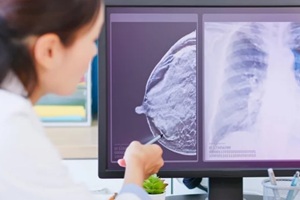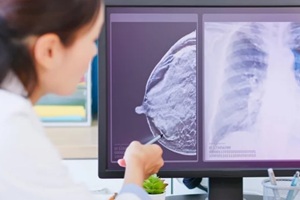 Breast cancer screening is an invaluable part of healthcare for women (and even men, sometimes!). A mammogram provides clarity into the state of the breast tissue, which can identify problems ranging from benign cysts to the development of cancer.
Breast cancer screening is an invaluable part of healthcare for women (and even men, sometimes!). A mammogram provides clarity into the state of the breast tissue, which can identify problems ranging from benign cysts to the development of cancer.
However, many people face challenges when considering scheduling a mammogram. While accessibility, cost, and awareness are all roadblocks to getting a mammogram as recommended, fewer people consider the psychology of breast cancer screening and how a person’s mentality can affect their exposure to mammograms.
From developing anxiety about the procedure before the mammogram is even scheduled to experiencing significant stress, depression, or even PTSD following a diagnosis, individuals can face severe psychological challenges related to breast health.
Preparing for the process ahead of time can ease these difficulties and make mammography a more seamless part of life that does not cause such distress.
Before the Mammogram
Before scheduling a mammogram, women may face psychological challenges that interfere with their ability or willingness to make an appointment at all.
Studies show that some individuals face severe anxiety about breast cancer screening—especially if they believe that they are especially susceptible to developing cancer (e.g., a family history) or they fear the severity, length, or cost of potential cancer treatments. This anxiety can cause defensive avoidance of screening, leaving women unwilling to schedule an appointment.
Those who do choose to schedule may continue to face anxiety, especially if the mammogram appointment they are attending is a follow-up to a previous abnormal report. This, too, can lead to avoidance, resulting in appointment cancellation.
After Breast Cancer Screening
For individuals who complete their breast cancer screening, psychological distress does not necessarily resolve. Studies indicate that conditions ranging from anxiety and depression to post-traumatic stress disorder (PTSD) can arise based on either the mammogram process itself or the results discovered therein.
Research following women after screening found that while a diagnosis of cancerous tissue resulted in increased anxiety, depression, and stress, so did heightened surveillance in non-confirmed diagnoses. In other words, women who were diagnosed with cancer through a mammogram screening were more anxious, depressed, and stressed.
 However, those who did not have a cancer diagnosis but whose doctors scheduled them for follow-up screenings after finding “suspicious” tissue, as well as those whose medical professionals provided what patients perceived as “extra” guidance, also suffered from significant anxiety.
However, those who did not have a cancer diagnosis but whose doctors scheduled them for follow-up screenings after finding “suspicious” tissue, as well as those whose medical professionals provided what patients perceived as “extra” guidance, also suffered from significant anxiety.
This may be caused by patients perceiving their doctors’ extra attention as suggesting something is wrong.
How to Prepare Mentally for Screening
Breast cancer screening can be intimidating, but when approached with preparation, individuals can replace their anxiety with confidence and reassurance. Understand that a mammogram aims to identify problematic cells as early as possible.
By getting mammograms regularly, patients can catch cancerous cells while they are still in the earliest phases—and sometimes before they have turned cancerous at all. Survival rates for a breast cancer diagnosis at this early stage are significantly higher, in some cases reaching nearly 100%.
Thus, mammography can ease patients’ worries by reassuring them that they are healthy and that any problematic cells are being attended to as soon as possible before any cancer can worsen. Other things that can help patients prepare include:
- Learning more about the mammography procedure – For patients nervous about the mammogram itself, watch videos or read step-by-step guides to help set expectations.
- Finding a doctor you can trust – Build rapport with a doctor in advance. This helps patients trust their recommendations rather than succumb to the anxiety associated with doctors who recommend follow-up care. Patients with a reliable medical team will trust their doctor to care for them properly, which can ease fears and reduce stress.
- Scheduling wisely – A mammogram can become more stressful when scheduled at an inconvenient time. Patients are more likely to cancel if they schedule their mammogram during the work day or when they must rush to the appointment. Choose a mammogram slot that fits into your day so you can feel confident and at ease.
Get Breast Cancer Screening to Ease Anxieties
 Breast cancer screening through mammography is an irreplaceable tool for keeping patients safe from the risks of breast cancer. It can be used alongside self-examination at home and clinical exams by your doctor to catch problems in their earliest stages when the tissue is still most responsive to treatment.
Breast cancer screening through mammography is an irreplaceable tool for keeping patients safe from the risks of breast cancer. It can be used alongside self-examination at home and clinical exams by your doctor to catch problems in their earliest stages when the tissue is still most responsive to treatment.
However, patients face numerous psychological barriers to breast cancer screening. Preparing for the appointment the right way can remove some of these challenges.
The professional team at Raleigh Gynecology and Wellness strives to make your mammogram as simple, seamless, and accessible as possible so you can schedule with confidence.
Contact Raleigh Gynecology and Wellness to select a slot for your mammogram appointment.
